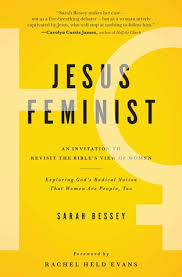 Sarah Bessey, Jesus Feminist: An Invitation to Revisit the Bible’s View of Women (New York: Howard Books, 2013). Paperback
Sarah Bessey, Jesus Feminist: An Invitation to Revisit the Bible’s View of Women (New York: Howard Books, 2013). Paperback
You know our mothers told us never to judge a book by its cover? I ignored that advice when I saw Jesus Feminist on the shelf at Barnes & Noble. Yellow is not my favorite color. I didn’t like the juxtaposition of the Cross and the Venus symbol. And despite being theologically egalitarian, I don’t like the word feminist. So, I left Sarah Bessey on the shelf and exited the store sans book.
Then my wife told me I needed to read Jesus Feminist. Her sister had read and loved it. A good friend had read and loved it. And the kind of books I liked to read were nerdy, she said, and no one other than me cared about them. So why not read and review something normal people actually liked?
As per usual, I listened to my wife, returned to Barnes & Noble, purchased a copy, and started reading. Although Sarah Bessey writes well and although I pretty much agree with her, I found reading the book’s initial pages to be a long, hard slog. She tells stories where I would assert propositions. She asks questions where I would offer answers. She assumes conclusions where I would make long arguments. Her authorial voice is so different than mine. I would approach the topic of “the Bible’s view of women” in such a different way.
Midway through chapter 2 (or was it 3?), I realized what the problem was. It wasn’t her, it was me. Here am I, a man, having a hard time listening to a woman make a case in her own voice on an issue where we agree. Let me repeat that for my male readers: I wasn’t listening to what a woman was saying because she was a woman.
Now, I realize that I am probably not Sarah Bessey’s intended reader. My guess is that she wrote this book for Christian women, not so much to argue for their equality with men from a biblical viewpoint as to assume it and urge them to get on with the Kingdom work God has called them to do. That being the case, good on her!
Still, it’s pretty hard on a guy to realize that his egalitarianism is theoretical rather than practical. That it exists in books and arguments rather than in his willingness to listen to a sister. For Sarah Bessey’s unintended effectiveness in exposing my, well, sexism, good on her!
Back to what the book actually says rather than its effect on me: Jesus loves women. Patriarchy is not God’s design for relations between the sexes. Husbands and wives need to figure out how their relationship works for them through trial and error, rather than based on rules that are allegedly exported from the Bible. Churches need to fully deploy (and employ) the feminine half of the congregation. Women’s ministries need to be missional, since God calls them to change the world, not make a craft. (Not that there’s anything wrong with that!) Christians need to do the hard work of addressing the lack of justice and peace in the world, much of which centers around the ill treatment of women and its side effects. And women don’t need permission; they just need blessing.
To which I say: Yes, yes, yes, yes, yes, yes, and yes, respectively.
Is Jesus Feminist a great book? I don’t know. It’s not the kind of book I normally read, so I don’t have a metric.
Is Sarah Bessey’s a needed voice? Yes. On behalf of women such as my wife, sister, and friend. And to men like me as well.
P.S. If you found my review helpful, please vote “Yes” on my Amazon.com review page.


I agree that “feminist” is not a word that would attract me to read a book. One of the reasons I don’t like Wayne Grudem’s calling the egalitarian position “evangelical feminism” — the term is so often associated with the pro-abortion movement.
As for your wife’s comment that no one but you cares about the “nerdy” books, she hasn’t met me.
Thanks for this, George. Your “confession” is receiving a mention in my SPS paper in March!
Oh dear. Please note that I was having a hard time listen to Sarah Bessey’s literary voice. I don’t have a hard time listening to women writers per se. I am, literally, the founder of the Gertrude Himmelfarb Fan Club, after all.
Hi! I recently reviewed this book too. I gave it a good review, yet its style was not my approach either, and I’m a female. I couldn’t quite put my finger on what it was, but I think you did: “She tells stories where I would assert propositions. She asks questions where I would offer answers. She assumes conclusions where I would make long arguments. Her authorial voice is so different than mine.” – Me too. I’m more of a logical learner – facts, arguments, etc. “Cut the stories, and get to the point!” But we all learn differently, and the book was certainly an encouraging pep-talk, that I think many can appreciate.